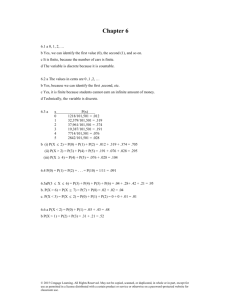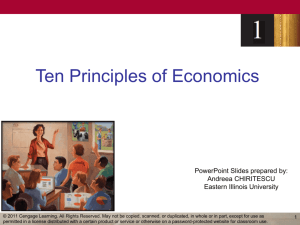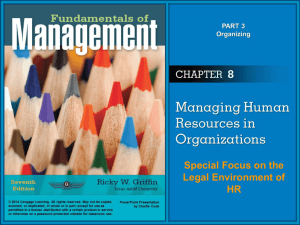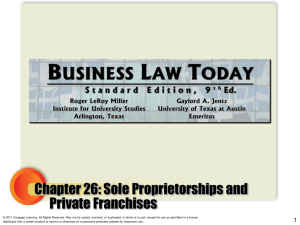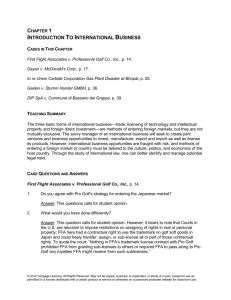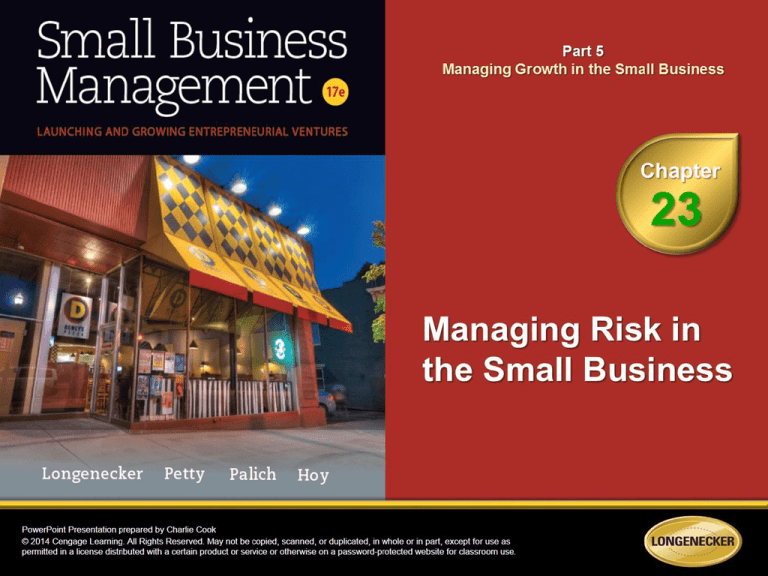
1. Define business risk, and explain its two
dimensions.
2. Identify the basic types of pure risk.
3. Describe the steps in the risk management
process, and explain how risk management
can be used in small companies.
4. Explain the basic principles used in
evaluating an insurance program.
5. Identify the common types of business
insurance coverage.
© 2014 Cengage Learning. All Rights Reserved. May not be copied, scanned, or duplicated, in whole or in part, except for use as
permitted in a license distributed with a certain product or service or otherwise on a password-protected website for classroom use.
23–2
What is Business Risk?
• Risk
The possibility of suffering harm or loss.
• Business Risk
The possibility of losses associated with the assets and the
earnings potential of a firm.
• Market Risk
The uncertainty (gain or loss) associated with an investment
decision.
• Pure Risk
The uncertainty associated with a situation where only loss or no
loss can occur—there is no potential for gain (only downside).
Only form of risk that is insurable.
© 2014 Cengage Learning. All Rights Reserved. May not be copied, scanned, or duplicated, in whole or in part, except for use as
permitted in a license distributed with a certain product or service or otherwise on a password-protected website for classroom use.
23–3
Basic Types of Pure Risk: Property
• Real Property
Land and anything physically attached to the land, such as
buildings
• Personal Property
Machinery, equipment, furniture, fixtures, stock, and vehicles
• Replacement Value of Property
The cost to replace or replicate property at today’s prices
• Actual Cash Value (ACV)
An insurance term that refers to the depreciated
value of a property
© 2014 Cengage Learning. All Rights Reserved. May not be copied, scanned, or duplicated, in whole or in part, except for use as
permitted in a license distributed with a certain product or service or otherwise on a password-protected website for classroom use.
23–4
Basic Types of Pure Risk (cont’d)
• Peril
A cause of loss, either through natural events or
through the acts of people
• Direct Loss
A loss in which physical damage to property reduces
its value to the property owner
• Indirect Loss
A loss arising from inability to carry on normal
operations due to a direct loss to property
© 2014 Cengage Learning. All Rights Reserved. May not be copied, scanned, or duplicated, in whole or in part, except for use as
permitted in a license distributed with a certain product or service or otherwise on a password-protected website for classroom use.
23–5
Liability Risks: Statutory Liability
• Workers’ Compensation Legislation
Laws obligating the employer to pay the employee for
an employment-related injury or illness, regardless
of fault.
© 2014 Cengage Learning. All Rights Reserved. May not be copied, scanned, or duplicated, in whole or in part, except for use as
permitted in a license distributed with a certain product or service or otherwise on a password-protected website for classroom use.
23–6
Business Activity-Related Liability Risks
• Contractual Liability
Performance or financial obligations (risks) that firms
assume when entering into contracts with other
parties
• Indemnification Clause
A contractual clause that requires one party to
assume the financial consequences of another party’s
legal liabilities.
© 2014 Cengage Learning. All Rights Reserved. May not be copied, scanned, or duplicated, in whole or in part, except for use as
permitted in a license distributed with a certain product or service or otherwise on a password-protected website for classroom use.
23–7
Liability Risks: Contractual Liability
• Torts
Wrongful acts or omissions for which an injured can
take legal action against the wrongdoer for monetary
damages
• Establishing Negligence
A legal duty between parties to act (or not to act) to
cause injury (damage)
A failure to provide the appropriate standard of care
The presence of actual injury or damages
Action that was proximate cause of injury or damage
© 2014 Cengage Learning. All Rights Reserved. May not be copied, scanned, or duplicated, in whole or in part, except for use as
permitted in a license distributed with a certain product or service or otherwise on a password-protected website for classroom use.
23–8
Liability Risks: Contractual Liability (cont’d)
• Reasonable (Prudent Person) Standard
The typical standard of care, based on what a
reasonable or prudent person would have done under
similar circumstances.
• Compensatory Damages
Economic or noneconomic damages intended to
make the claimant whole, by indemnifying the
claimant for any injuries or damage arising from the
negligent action
© 2014 Cengage Learning. All Rights Reserved. May not be copied, scanned, or duplicated, in whole or in part, except for use as
permitted in a license distributed with a certain product or service or otherwise on a password-protected website for classroom use.
23–9
Torts: Types of Compensatory Damages
• Economic Damages
Compensatory damages related to an economic loss,
such as medical expense, loss of income, or the cost
of property replacement/restoration
• Noneconomic Damages
Compensatory damages for such losses as pain and
suffering, mental anguish, and loss of consortium
• Punitive Damages
Damages intended to punish wrongdoers for gross
negligence or a callous disregard for the interests of
others and to have a deterrent effect
© 2014 Cengage Learning. All Rights Reserved. May not be copied, scanned, or duplicated, in whole or in part, except for use as
permitted in a license distributed with a certain product or service or otherwise on a password-protected website for classroom use.
23–10
Product Liability
• Manufacturing Defect
A defect resulting from a problem that occurs during
the manufacturing process causing the product to subsequently
not be made according to specifications.
• Design Defect
A defect resulting from a dangerous design, even though the
product was made according to specifications.
• Marketing Defect
A defect resulting from failure to convey to the user that hazards
are associated with a product or to provide adequate instructions
on safe product use.
© 2014 Cengage Learning. All Rights Reserved. May not be copied, scanned, or duplicated, in whole or in part, except for use as
permitted in a license distributed with a certain product or service or otherwise on a password-protected website for classroom use.
23–11
Premises Liability
Automobile Liability
Operations Liability
Product Liability
Sources of
Tort Liability
Professional Liability
Completed
Operations Liability
Employers’ Liability
Directors and
Officers Liability
© 2014 Cengage Learning. All Rights Reserved. May not be copied, scanned, or duplicated, in whole or in part, except for use as
permitted in a license distributed with a certain product or service or otherwise on a password-protected website for classroom use.
23–12
Personnel Risks
• Personnel Risks
Risks that directly affect individual employees, but
may have an indirect impact on a business as well.
Premature death
Poor health
Insufficient retirement income
© 2014 Cengage Learning. All Rights Reserved. May not be copied, scanned, or duplicated, in whole or in part, except for use as
permitted in a license distributed with a certain product or service or otherwise on a password-protected website for classroom use.
23–13
Risk Management
• Risk Management
Involves ways of coping with risk that are designed to
preserve assets and the earning power of a firm.
Involves finding the best way possible to reduce the
cost of dealing with risk.
Insurance is only one of several approaches to
minimizing the pure risks a firm is sure to encounter.
© 2014 Cengage Learning. All Rights Reserved. May not be copied, scanned, or duplicated, in whole or in part, except for use as
permitted in a license distributed with a certain product or service or otherwise on a password-protected website for classroom use.
23–14
The Process of Risk Management
1
Identify and understand risks.
2
Evaluate risks.
3
Select methods to manage risks.
4
Implement the decision.
5
Review and evaluate.
© 2014 Cengage Learning. All Rights Reserved. May not be copied, scanned, or duplicated, in whole or in part, except for use as
permitted in a license distributed with a certain product or service or otherwise on a password-protected website for classroom use.
23–15
23.1
Risks on the Road to Success
© 2014 Cengage Learning. All Rights Reserved. May not be copied, scanned, or duplicated, in whole or in part, except for use as
permitted in a license distributed with a certain product or service or otherwise on a password-protected website for classroom use.
23–16
Risk Management in the Small Business
• Risk Management Differences from Large Firms:
Small businesses pay insufficient attention to
analyzing potential risk.
Large firms can assign responsibilities for risk
management to a specialized staff manager.
Risk management is not something that requires
immediate attention—until something happens.
© 2014 Cengage Learning. All Rights Reserved. May not be copied, scanned, or duplicated, in whole or in part, except for use as
permitted in a license distributed with a certain product or service or otherwise on a password-protected website for classroom use.
23–17
Loss
Prevention
Loss
Avoidance
Risk
Control
Loss
Reduction
© 2014 Cengage Learning. All Rights Reserved. May not be copied, scanned, or duplicated, in whole or in part, except for use as
permitted in a license distributed with a certain product or service or otherwise on a password-protected website for classroom use.
23–18
Risk Transfer
Partially SelfFunded Program
Risk Retention
Risk
Financing
Specific Stop
Loss Limit
Self-Insurance
Aggregate Stop
Loss Limit
© 2014 Cengage Learning. All Rights Reserved. May not be copied, scanned, or duplicated, in whole or in part, except for use as
permitted in a license distributed with a certain product or service or otherwise on a password-protected website for classroom use.
23–19
Basic Principles of a Sound Insurance Program
Identify business
risks that can be
insured
Secure coverage for
all major potential
losses
Evaluating an
Insurance Program
Relate premium costs
to probability of loss
© 2014 Cengage Learning. All Rights Reserved. May not be copied, scanned, or duplicated, in whole or in part, except for use as
permitted in a license distributed with a certain product or service or otherwise on a password-protected website for classroom use.
23–20
Requirements for Obtaining Insurance
• The risk must be calculable so that premiums
can be calculated.
• The risk must exist in large enough numbers to
allow the law of averages to work.
• The insured property must have commercial
value.
• The policyholder must have an insurable interest
in the property or person insured.
© 2014 Cengage Learning. All Rights Reserved. May not be copied, scanned, or duplicated, in whole or in part, except for use as
permitted in a license distributed with a certain product or service or otherwise on a password-protected website for classroom use.
23–21
Common Types of Business Insurance
• Property and Casualty Insurance
Named-peril approach
Identifies the specific perils covered.
All-risk approach
Defines the perils covered by stating that all direct damages
to property are covered except those caused by perils
specifically excluded.
Coinsurance provision
Property must be insured for at least 80% of its value or a
penalty will be applied to any covered loss.
© 2014 Cengage Learning. All Rights Reserved. May not be copied, scanned, or duplicated, in whole or in part, except for use as
permitted in a license distributed with a certain product or service or otherwise on a password-protected website for classroom use.
23–22
Coinsurance Example
If an insured building had a replacement value of $500,000, the 80
percent policy limit would require that the property be insured for at
least $400,000 ($500,000 x 0.80). If the building was insured for only
$300,000 and an insured loss of $100,000 occurred, the recovery
would be limited to $75,000, calculated as follows:
© 2014 Cengage Learning. All Rights Reserved. May not be copied, scanned, or duplicated, in whole or in part, except for use as
permitted in a license distributed with a certain product or service or otherwise on a password-protected website for classroom use.
23–23
Property and Casualty Insurance (cont’d)
• Business Interruption Insurance
Reimburses for lost income plus continuing expenses
due to direct loss impacting business revenues.
• Commercial General Liability (CGL) Coverage
Covers bodily injury and property damage for which
the business is liable.
• Automobile Insurance
Protects against liability and physical damage to a
vehicle resulting from insured perils such as collision,
theft, vandalism, hail, and flood.
© 2014 Cengage Learning. All Rights Reserved. May not be copied, scanned, or duplicated, in whole or in part, except for use as
permitted in a license distributed with a certain product or service or otherwise on a password-protected website for classroom use.
23–24
Property and Casualty Insurance (cont’d)
• Workers’ Compensation Insurance
Provides benefits to employees for medical expenses,
loss of wages, and rehabilitation expenses, as well as
death benefits for employees’ families.
• Crime Insurance
Coverage against employee dishonesty.
© 2014 Cengage Learning. All Rights Reserved. May not be copied, scanned, or duplicated, in whole or in part, except for use as
permitted in a license distributed with a certain product or service or otherwise on a password-protected website for classroom use.
23–25
Property and Casualty Insurance (cont’d)
• Business Owner’s Policy (BOP)
A business version of a homeowner’s policy,
designed to meet the personal property and general
liability insurance needs of small business owners
• Advantages of BOP
A lower premium than would otherwise be required to
purchase all coverages separately
Automatic inclusion of business interruption insurance
Automatic replacement value protection, as opposed
to actual cash value protection
© 2014 Cengage Learning. All Rights Reserved. May not be copied, scanned, or duplicated, in whole or in part, except for use as
permitted in a license distributed with a certain product or service or otherwise on a password-protected website for classroom use.
23–26
Property and Casualty Insurance (cont’d)
• Package Policy
A policy for small businesses that do not qualify for a
BOP that combines property insurance and
commercial general liability insurance.
• Advantages of Package Policy
A lower premium than would otherwise be required to
purchase all coverages separately
Ease of adding other coverages more economically
Inclusion of business interruption insurance
Inclusion of crime insurance.
© 2014 Cengage Learning. All Rights Reserved. May not be copied, scanned, or duplicated, in whole or in part, except for use as
permitted in a license distributed with a certain product or service or otherwise on a password-protected website for classroom use.
23–27
Umbrella
liability
policies
Cyber
liability
policies
Miscellaneous
Policies
Inland
marine
policies
Professional
liability
policies
© 2014 Cengage Learning. All Rights Reserved. May not be copied, scanned, or duplicated, in whole or in part, except for use as
permitted in a license distributed with a certain product or service or otherwise on a password-protected website for classroom use.
23–28
Life and Health Insurance
• Health Insurance
Coverage for medical care at hospitals, doctors’
offices, and rehabilitation facilities, that usually
includes outpatient services and prescription drugs.
• Health Maintenance Organization (HMO)
A managed-care network that is less expensive than
that of a PPO but limits employees’ choices of
medical care providers more than a PPO does.
• Preferred Provider Organization (PPO)
A managed-care network that provides health
insurance that is generally more expensive than an
HMO but offers a broader choice of medical providers
© 2014 Cengage Learning. All Rights Reserved. May not be copied, scanned, or duplicated, in whole or in part, except for use as
permitted in a license distributed with a certain product or service or otherwise on a password-protected website for classroom use.
23–29
Life and Health Insurance (cont’d)
• Key-Person Insurance
Provides benefits upon the death
of a firm’s key personnel.
• Disability Insurance
Provides benefits upon the disability of
a firm’s partner or other key employee.
Disability buyout insurance
Key-person disability insurance
© 2014 Cengage Learning. All Rights Reserved. May not be copied, scanned, or duplicated, in whole or in part, except for use as
permitted in a license distributed with a certain product or service or otherwise on a password-protected website for classroom use.
23–30
Key Terms
actual cash value (ACV)
aggregate stop loss limit
all-risk approach
automobile insurance
business interruption insurance
business owner’s policy (BOP)
business risk
coinsurance clause
commercial general liability (CGL)
insurance
compensatory damages
crime insurance
design defect
direct loss
disability buyout insurance
disability insurance
economic damages
health maintenance organization
(HMO)
indemnification clause
indirect loss
key-person life insurance
loss avoidance
loss prevention
loss reduction
manufacturing defect
market risk
marketing defect
© 2014 Cengage Learning. All Rights Reserved. May not be copied, scanned, or duplicated, in whole or in part, except for use as
permitted in a license distributed with a certain product or service or otherwise on a password-protected website for classroom use.
23–31
Key Terms
named-peril approach
noneconomic damages
package policy
partially self-funded program
peril
personal property
personnel risks
preferred provider organization
(PPO)
proximate cause
punitive damages
pure risk
real property
reasonable (prudent person)
standard
replacement value of property
risk control
risk financing
risk management
risk retention
risk transfer
self-insurance
specific stop loss limit
torts
workers’ compensation insurance
workers’ compensation
legislation
© 2014 Cengage Learning. All Rights Reserved. May not be copied, scanned, or duplicated, in whole or in part, except for use as
permitted in a license distributed with a certain product or service or otherwise on a password-protected website for classroom use.
23–32
Key Terms
commercial general liability (CGL) insurance
automobile insurance
crime insurance
business owner’s policy (BOP)
package policy
health insurance
health maintenance organization (HMO)
preferred provider organization (PPO)
key-person insurance
disability insurance
© 2014 Cengage Learning. All Rights Reserved. May not be copied, scanned, or duplicated, in whole or in part, except for use as
permitted in a license distributed with a certain product or service or otherwise on a password-protected website for classroom use.
23–33


